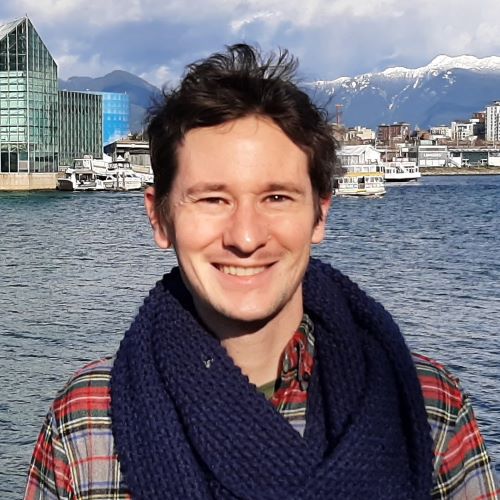Jonathan Eaton
Research Area
Education
M.A., University of Toronto, Canada, 2011
B.A., Valparaiso University, USA, 2009
About
I am a socio-cultural anthropologist with a focus on heritage, the anthropology of space and place, and the anthropology of disaster. In my current work, I am seeking to understand the affective connections among people, heritage, and hazards within the multilayered temporalities of disaster planning in Vancouver. I ask how a bit of care and cultivation of place can help people preserve what they value in the face of the unpredictability of earthquakes in this region. My past experience as a Fulbright scholar and heritage practitioner in Albania with the organization Cultural Heritage without Borders taught me to appreciate the importance of everyday moments connecting people and place.
Research
Research keywords:
Heritage, space and place, values, urban/disaster planning, disaster recovery, uncertainty, futures, natural hazards, human-nonhuman relations, Vancouver, Canada
Research summary:
My dissertation research focuses on heritage and place-based values in relation to planning for disaster recovery on a neighbourhood scale in Vancouver, BC. Through long-term ethnographic fieldwork with community-based groups in the Dunbar and Grandview neighbourhoods, I consider the relationships people nurture with each other and their built environment over time, within an atmosphere of approaching climate catastrophe and uncertain seismic destruction.
Large earthquakes are simultaneously knowable and unknowable in the Pacific Northwest. While Indigenous oral histories and geological analyses confirm that earthquakes have shaped life and landscapes across the region for millennia, at the same time, no one alive today has experienced a destructive earthquake in Vancouver and its environs. Given the unpredictability of major earthquakes, plans for reducing seismic vulnerabilities must vie for political capital alongside the many present crises facing the city, including among others, a global pandemic, the climate emergency, and a housing and affordability crisis, which are also entangled with contested histories and contemporary urban imaginaries. By placing a pre-disaster society in the temporal space of long-term post-disaster recovery, my research intends to draw out lessons for recovery planning in an unpredictable present.
PhD Supervisor: Dr. Sara Shneiderman
Committee Members: Dr. Stephanie Chang (SCARP), Dr. Gastón Gordillo, and Dr. Jennifer Kramer
Publications
2024. The state of disaster and resilience literature in British Columbia, Canada. A systematic scoping review. International Journal of Disaster Risk Reduction 113. https://doi.org/10.1016/j.ijdrr.2024.104848 (with C. Milne, T. Legere, S. Shneiderman, and C. Molina Hutt)
2023. As we fight the Alberta and B.C. wildfires, we must also plan for future disasters. The Conversation. Link to article (with S. Shneiderman)
2022. Heritage Languages and Language as Heritage: The Language of Heritage in Canada and Beyond. International Journal of Heritage Studies 28(7). https://doi.org/10.1080/13527258.2022.2077805 (with M. Turin)
2022. Austrian Economics on Mushrooms: A Mycelial Approach to Understanding Market Processes in Pre-Disaster Recovery Planning in Vancouver, Canada. In Market Process and Market Order: From Human Action, but Not of Human Design. Eds. Christopher Coyne, Rosolino Candela and Kristen Collins. Lanham, MD: Rowman & Littlefield. UBC Library e-book link
2022. Acting Out the Future of the Albanian National Theatre: New Heritage at the Intersection of Resistance and New Media. In Theorizing Heritage through Non-Violent Resistance. Eds. Evren Uzer and Feras Hammami. London: Palgrave, 41-69. https://doi.org/10.1007/978-3-030-77708-1_3 (with K. Rocker)
2021. Living with Earthquakes, Past and Future. Review of Shake Up and A Future for Memory, Museum of Anthropology, University of British Columbia. Visual Anthropology Review 37(2), 463-469. https://doi.org/10.1111/var.12252
2017. Rebuilding the Broken: Regional Restoration Camps as a Meeting Platform in the Western Balkans. In Heritage and Peacebuilding. Eds. Diana Walters, Daniel Laven & Peter Davis. Suffolk, UK: Boydell & Brewer, 205-219. (with L. Hadžić) Publisher e-book link
2016. The Consequences of Neglect: Confronting Neglected Heritage as an Integral Part of Emergency Preparedness and Response. e-dialogos 5, 42-51.
2016. A Dialogue Toolkit: Tips and Techniques from the Dialogues for Spaç Project. Cultural Heritage without Borders-Albania and the International Coalition of Sites of Conscience. Available at: https://www.sitesofconscience.org/wp-content/uploads/2018/08/Spac-Toolkit-2017-Final.pdf (with M. Bllaci, N. Petri, and K. Rocker)
2015. Overview Report of the Nepal Cultural Emergency Crowdmap Initiative. Available at: https://www.iccrom.org/news/nepal-cultural-emergency-report (with colleagues from ICCROM and ICOMOS-ICORP)
2015. Tirana: Life After Demolition. Clog: Landmark. (with S. Battisti)
2014. Chiseling away at a concrete legacy: Engaging with Communist-era heritage and memory in Albania. Journal of Field Archaeology 39(3), 312-319. https://doi.org/10.1179/0093469014Z.00000000084 (with E. Roshi)
2014. Restoration, Reconciliation, Hopes for the Future: Cultural Heritage without Borders – 17 years in the Western Balkans. In The Politics of Heritage and Memory. Zagreb: University of Zagreb. (with L. Hadžić)
2010. Voice of the Western Balkans, Voice of Europe. Tirana Times, 7. (with T. Hashimoto and M. Dulaku)
Awards
2020 – UBC President’s Academic Excellence Initiative PhD Award
2019 – Vanier Canada Graduate Scholarship
2019 – UBC Public Scholars Initiative
2019 – UBC Four Year Fellowship
2018 – UBC Faculty of Arts Graduate Award
2014 – EU Prize for Cultural Heritage / Europa Nostra Award in the category of ‘Education, Training and Awareness-raising’ (with the team of Cultural Heritage without Borders-Albania)
2011 – American Councils Title VIII Southeast European Language and Research Fellowship
2009 – J. William Fulbright Award to Albania
